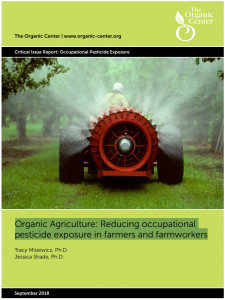Organic Agriculture: Reducing occupational pesticide exposure in farmers and farmworkers
The Organic Center released a report that details the impacts of the conventional use of synthetic pesticides on farmer and farmworker health - and how organic can be used as a model to decrease the exposure of this important part of our society.
 Farmers and farmworkers are a fundamental part of the global food system, but the sustained use of agricultural chemicals puts this population at serious risk for a wide range of adverse health effects — a consequence of agriculture that is largely overlooked.
Farmers and farmworkers are a fundamental part of the global food system, but the sustained use of agricultural chemicals puts this population at serious risk for a wide range of adverse health effects — a consequence of agriculture that is largely overlooked.
A wide range of regulatory pesticide management regimes exists worldwide and can be highly variable both in rigor and enforcement. However, even under the best regulations, there is still potential for harm.
There is a growing awareness of how agricultural chemicals affect our health and the health of our environment. Consumers want to learn more as they strive to make the best choices for themselves and their families. Consumers often cite reduced pesticide exposure and environmental stewardship as the top reasons they choose organic products, yet organic systems also provide substantial benefits for farmworkers and agricultural communities by prohibiting most toxic synthetic pesticides.
This project investigates the impacts of pesticide exposure on farmer and farmworker health, and demonstrates how the implementation of organic practices can help minimize those exposures. We look at how adult farmers and farmworkers are exposed to pesticides, the negative health consequences of those exposures, and the organic production practices and processes used by organic agriculture to protect farmers and farmworkers. This project also provides a clear overview of pest management practices that can be implemented in any farming system to reduce the need for pesticides to fight pests and diseases.
We synthesized over 120 research studies from around the world to understand the health impacts of occupational exposure to toxic synthetic pesticides on farmers and farmworkers, and elucidate how organic farming methods and the regulations that govern USDA certified organic farming systems directly benefit this community.
The health and safety of those who produce our food should be a top concern for all of us, and consumers can take action to support healthy farming communities by choosing food grown organically. By shifting to more sustainable food production systems that rely on balanced ecosystems as a first line of defense against pests, we can ensure sustainable food security and healthy agricultural communities into the future.
Download the full report
Read the press release
HIGHLIGHTS
Over 1.1 billion pounds of agricultural chemicals are used annually in the United States, and pesticide exposures on conventional farms cause thousands of illnesses every year. A large body of research documents the health risks associated with both short- and long-term exposure to pesticides: cancer, neurodegenerative disorders and poor reproductive health. Even with the best management practices while handling and applying pesticides, farmers and farmworkers are still at risk for exposure. The adoption of organic techniques that avoid the use of toxic, synthetic pesticides provides the surest safeguard against chemical-related occupational health problems.
Almost 1,400 pesticides with over 900 active ingredients are registered with the Environmental Protection Agency (EPA) and approved for use in the United States. Organic farmers are required by law to follow strict standards set forth by the National Organic Production Act that include implementing cultural methods to control pests before any pest control substance may be applied. Some of the most common cultural practices utilized by organic farmers to manage pests include crop rotations, intercropping, the use of buffers and hedgerows, and the promotion of soil health to balance the farm ecosystem.
In cases where these practices are ineffective in combating a pest, organic farmers are allowed to use naturally occurring pest control products and restricted to about 25 synthetic materials approved by the National Organic Standards Board and deemed to pose little threat to humans and the environment. These substances undergo review every five years to assess any new knowledge of risk to humans and the environment, and to ensure protection of the population most vulnerable to the adverse health effects of pesticide exposure.
By definition, pesticides are toxic to living organisms, so it is not surprising they can also be toxic to the environment and humans. While the adverse effects of pesticides on beneficial insect predators, song birds, pollinators and native plants are well documented, the unintended effects of pesticides on humans are perhaps the most concerning. Farmers and farmworkers, who are exposed to pesticides at higher doses and with greater frequency than the general public and often exposed to pesticides significantly more toxic because they are restricted from use by the general public, are at the greatest risk to the serious consequences of exposure.
RESEARCH PARTNERS
Dr. Tracy Misiewicz, The Organic Center
Dr. Jessica Shade, The Organic Center
FUNDING PARTNERS
The Organic Center
UNFI Foundation



